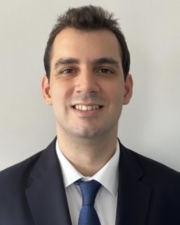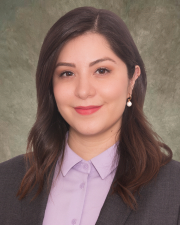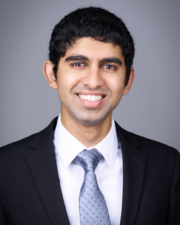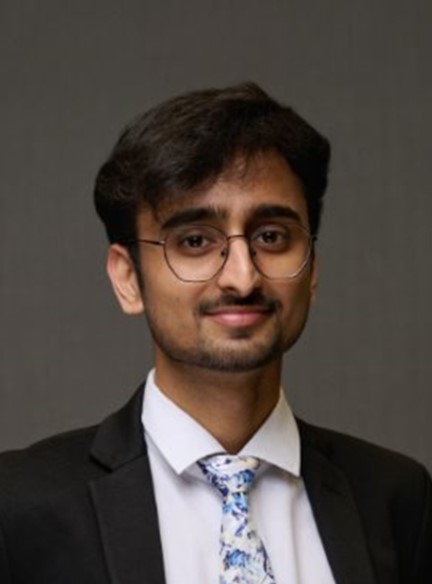Meet the Residents
 Nurhak Dogan received his medical training at the Celal Bayar University, Faculty of Medicine in Manisa, Turkey. He completed a child and adolescent psychiatry residency program at Ege University in Izmir, Turkey. During his residency training, he participated in studies particularly related to neurodevelopmental disorders. Nurhak’s career goal is to complete adult and child psychiatry program in Houston and develop himself regarding clinical and academical skills.
Nurhak Dogan received his medical training at the Celal Bayar University, Faculty of Medicine in Manisa, Turkey. He completed a child and adolescent psychiatry residency program at Ege University in Izmir, Turkey. During his residency training, he participated in studies particularly related to neurodevelopmental disorders. Nurhak’s career goal is to complete adult and child psychiatry program in Houston and develop himself regarding clinical and academical skills.
Why I chose UTH Child Track: I chose the University of Texas Health Science Center at Houston due to their distinguished faculty, advanced clinical facilities, and dedication to raise mental health professionals with different and exceptional angles. In addition to these, I realized and felt that I can develop myself not only about clinician-academician pathways, but also regarding self-improvement characteristics within great atmosphere in UTHealth Houston.
 Valeria earned her medical degree from Universidad Autónoma de Baja California in Tijuana, Mexico, and a Master of Arts in Developmental Psychology from Teachers College, Columbia University. Prior to starting her residency, she participated as a Research Assistant in a research project at Stanford University focusing on chronic trauma and building resiliency in adolescents. Her current interest in child and adolescent psychiatry centers on psychotherapy and the impact of trauma on development.
Valeria earned her medical degree from Universidad Autónoma de Baja California in Tijuana, Mexico, and a Master of Arts in Developmental Psychology from Teachers College, Columbia University. Prior to starting her residency, she participated as a Research Assistant in a research project at Stanford University focusing on chronic trauma and building resiliency in adolescents. Her current interest in child and adolescent psychiatry centers on psychotherapy and the impact of trauma on development.
Why I chose UTH Child Track: Training at the world’s largest medical center provides me with exposure to a wide range of psychopathologies, giving me the confidence to handle any challenging case. Additionally, Houston’s large Hispanic/Latino community aligns with my passion for serving this population. UTH’s Child Track allows me to pursue my passion for Child and Adolescent Psychiatry while also building a strong foundation in adult psychiatry, fully preparing me for success in any future clinical setting.
 Rishab received his medical degree from Medical College of Georgia in Augusta, GA, where he was also born and raised. During medical school, he served as a facilitator for the GA Resilient Teens Program through which he led small-group sessions on healthy relationships and stress management for local youth. He has a background in tutoring refugee students and learned how the trauma of resettlement disrupted their development. He has become passionate about childhood as a period of social-emotional growth and curiosity, and his research interests lie at the intersection of infant & early childhood mental health (IECMH) and cross-cultural psychiatry. He is very grateful for my mentors in AACAP and attribute much of his success to their guidance.
Rishab received his medical degree from Medical College of Georgia in Augusta, GA, where he was also born and raised. During medical school, he served as a facilitator for the GA Resilient Teens Program through which he led small-group sessions on healthy relationships and stress management for local youth. He has a background in tutoring refugee students and learned how the trauma of resettlement disrupted their development. He has become passionate about childhood as a period of social-emotional growth and curiosity, and his research interests lie at the intersection of infant & early childhood mental health (IECMH) and cross-cultural psychiatry. He is very grateful for my mentors in AACAP and attribute much of his success to their guidance.
Why I chose UTH Child Track: I chose UTH Child Track because I knew I would be supported in my future endeavors, whether they be in advocacy, outreach, psychotherapy training, or scholarly work. The program is the ideal mix of community-mindedness and academic rigor that I was seeking, along with proximity to loved ones.
A rpit graduated from the All India Institute of Medical Sciences, Rishikesh, where his passion for psychiatry grew through leading a peer support group and developing school and community-based mental health initiatives for underserved youth in collaboration with regional non-profits. He has presented his research at major conferences like AACAP and ACLP and worked on topics ranging from neuropsychiatry to mindfulness interventions in oncology, earning recognition on global platforms. His previous leadership roles, including International Region Chair for PsychSIGN reflect his commitment to building a global psychiatry community and advancing child and adolescent mental health. He also completed formal academic training in psychoanalytic psychotherapy, which he hopes to integrate into his future career as a Child Psychiatrist.
rpit graduated from the All India Institute of Medical Sciences, Rishikesh, where his passion for psychiatry grew through leading a peer support group and developing school and community-based mental health initiatives for underserved youth in collaboration with regional non-profits. He has presented his research at major conferences like AACAP and ACLP and worked on topics ranging from neuropsychiatry to mindfulness interventions in oncology, earning recognition on global platforms. His previous leadership roles, including International Region Chair for PsychSIGN reflect his commitment to building a global psychiatry community and advancing child and adolescent mental health. He also completed formal academic training in psychoanalytic psychotherapy, which he hopes to integrate into his future career as a Child Psychiatrist.
Why I chose UTH Child Track: I chose UTH because it offers the flexibility to tailor training to my career interests, including dedicated tracks and opportunities to engage in large-scale community mental health projects like TMCHCC. Training within the largest academic psychiatric hospital provides unparalleled exposure to diverse psychopathologies and levels of acuity. I was also drawn to the program’s culture of being supportive, collaborative, and close-knit, where everyone truly feels like family.